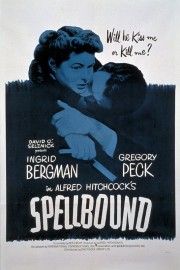Spellbound
The psychology of his characters was at the heart of several of Alfred Hitchcock’s finest films. The obsession with a dead wife in “Rebecca.” The pains of childhood trauma in “Marnie.” The guilt over being unable to save a loved one in “Vertigo.” And of course, the split personality of Norman Bates in “Psycho.” While all of those explorations of the mind were just below the surface of those thrillers, Hitchcock made the concept of psychoanalysis the very subject of one of his least-heralded films, the 1945 drama “Spellbound.”
The film was suggested by the novel, The House of Dr. Edwardes by Francis Beeding, and as adapted by Angus MacPhail and Ben Hecht, the story fits right in with those previously-mentioned Hitchcock films. “Spellbound” stars Ingrid Bergman as Dr. Constance Petersen, a psychiatrist working at an institution for the mentally ill. A reserved woman, Dr. Petersen keeps herself at a distance from emotional involvement, whether it’s with her patients, or her colleagues. But that begins to change when the chief of staff at the institution is forced into retirement, and Dr. Anthony Edwardes (Gregory Peck), a young and famous psychoanalyst, takes over. Dr. Petersen is instantly swept away, but it’s not long after their love begins to blossom that Dr. Edwardes’s own inner turmoils come to the surface, leading to a mystery of the mind as only the Master of Suspense can weave.
Yes, that last sentence sounds like one of those corny, attention-grabbing taglines one might have seen during the trailer for this film back in 1945, but the truth remains that Hitchcock remains one of the few filmmakers capable of really exploring the human mind from not just an analytical perspective, but from an emotional one. Yes, we have had filmmakers since Hitch that have been fascinated by questions of the mind (think Christopher Nolan, Stanley Kubrick, David Lynch, and Martin Scorsese with 2010’s “Shutter Island”), but with Hitchcock, he seems more interested in matters of the heart. That’s a key element of “Spellbound,” seeing as though Drs. Petersen and Edwardes are a romantic pair as much as their relationship becomes that of a doctor and patient. No, Hitchcock isn’t interested in the ethical question of a doctor falling in love with her patient, but that’s not a problem with this film, especially with stars as radiant and charismatic as Bergman and Peck as the pair in question.
Peck has the trickiest role, but then again, mentally trouble characters really should be. As well as being a romantic foil for Bergman (one of the loveliest of all movie stars), he also has to hint as the secrets and insecurities at the core of his character, and even if it doesn’t rate with his greatest performances (“To Kill a Mockingbird” and “Cape Fear” come to mind), Peck rises to the challenges of the material. Hitchcock helps him with three stylistic choices: the first is the visual strategy of parallel lines, which throw the character into fits of panic and anxiety; the Oscar-winning score by Miklos Rozsa, which admittedly goes over-the-top too much, but evokes deep turmoil with its innovative use of the theramin; and a dream sequence designed by master surrealist Salvador Dali that has likely served as inspiration to everyone from David Lynch to the Coen Brothers to Charlie Kaufman and Satoshi Kon. The dream sequence helps unlock the keys to Peck’s character, who inspires such passion in Dr. Petersen that she’s willing to risk everything for his lasting health, and for love.
In a lot of ways, Alfred Hitchcock could be among the most cynical of filmmakers; why else would he find himself drawn to such macabre tales as “Strangers on a Train,” “Rope,” or “Vertigo,” in which the main character, whom has emotional demons, falls in love with a woman, loses her when she kills herself, and then finds another woman who reminds him of her, falls in love with her, only to lose that one as well. Like that film, “Spellbound” pulls several rugs out from under the audience, and has several moments of doubt and cynicism in human nature, but unlike “Vertigo,” love wins out in the end, but not without the cruel ironies that sometimes befall the main characters in Hitchcock films. In the end, Hitch was always a romantic, even if his films fed off of paranoia and psychological pains his characters didn’t always understand themselves. In that respect, “Spellbound” is one of his most enduring films, not just for how it depicts the love his characters find, but in how they earn the chance to have that embrace before the credits roll.










